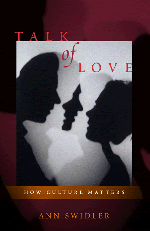
Ann Swidler argues that we operate using complex cultural repertoires. These are the propensities, scripts, frameworks, and logics—the tools with which to navigate everyday life. Our repertoires are vast, and often contradictory—and yet we deftly pull what we need, when we need it, easily ignoring contradictions. She illustrates these practices through narratives of romantic love, in which participants, within the same interview, draw seamlessly on logics of independence (e.g. we are separate people and we need our separate space), intertwinement (e.g. we have grown together over the years, our marriage is a true union of two souls), fate (e.g. we were meant to be) and rationality (e.g. marriage is a product of hard work and sacrifice).
With Swidler’s cultural tool kit as a framework, we can begin to make sense of the logical gymnastics that enabled a Virginia Sheriff to fire his subordinates for hitting a Facebook “Like” button in support of an opposing candidate and then argue successfully in court that this firing was not a violation of free speech.
Here’s the story: In 2009, Sheriff B.J. Roberts fired six employees for hitting the “Like” button on Facebook in favor of a rival candidate (Jim Adams) in an upcoming election. One of the employees fired, Deputy Daniel Ray Carter Jr., is contesting the firing in court. Carter argues that “Liking” should be protected under his first amendment rights. The initial ruling from a U.S. District Court in Virginia ruled in favor of Roberts, opining that free-speech is only protected when someone says something. “Liking,” the court ruled, is not a sufficient form of expression. Carter continues to pursue the case through higher level courts.
This ruling of the District Court requires numerous logical contradictions. Let us briefly review the two most egregious:
1) Language is a shared symbol system. “Like” is a symbol that conveys shared meaning. Yet, the court ruled that “Like” is not, in fact, a form of expression.
2) Sheriff Roberts fired his employees BECAUSE “Like” expressed a political view that he found inappropriate. Yet, Sheriff Roberts’ defense rests on notion that “Liking” something is not a political statement (Really Roberts? Then why did you fire them!?).
What we see here, is that although numerous cultural tools are in play (a la Swidler), this argument rests on an overarching framework of digital dualism. The (oddly calculated) sum total of empirical circumstances surrounding this case concludes that digitally mediated symbol systems do not constitute real mechanisms of communication.
But the story goes deeper. We are currently in what Swidler refers to as “unsettled times” with regards to digital technologies. This is a time/space in which social reality is still in negotiation. The cultural tool kit is still being stocked, we must rely upon often outdated tools, and new acquisitions are up for debate. How these debates play out are of crucial significance. Indeed, if this case is not overturned, and a Facebook “Like” is legally considered something other than communication, digital dualism will more firmly embed itself into our institutional and cultural logic. In turn, if the case is overturned, it will be a boon for the cultural logic of augmented reality.
Of course, the cultural contests of unsettled times do not happen in a vacuum—or better said, a meritocracy. Rather, they are subject to the power relations that pervade social, political, and economic life. The logic that aligns with interests of the powerful is, in most cases, the logic that wins out. In relation to the present case, a digital dualist logic aligned with the interests of the more powerful party (i.e. an elected official), and in turn, the legal system not only took this logic seriously, but upheld it in the face of a less powerful challenger. This is not to say that the less powerful have no chance, but that the relative power of promulgators matters, and those with greater power have more freedom in selecting their cultural tools, and more efficacy in spreading them.
More concretely, Carter’s case will be much stronger with the support of powerful groups who back his cultural logic—and in turn, back his legal argument. And indeed, he now has such support, as his appeal was filed by the ACLU, and includes the following statement by multi-billion dollar Facebook Inc.: “like” for a political candidate is the 21st-century equivalent of a front-yard campaign sign.
In these unsettled times, battles such as this have implications beyond the parties involved. They shape institutional meanings and cultural logics. They lay the foundation for an eventual settled future. And indeed, these battles, their outcomes, and their implications reflect and buttress existing social hierarchies.
Photos creds (in order):
Jenny Davis is a Doctoral Candidate in the Department of Sociology at Texas A&M University. She is a regular author on the Cyborgology blog. Follow Jenny on Twitter: @Jup83

Comments 2
Amanda — August 20, 2012
Very interesting. While I make no claim to be a constitutional scholar/legal expert, I can't help but think we, as a country, have already decided parameters of free speech aren't simply limited to vocalization. SCOTUS has already defined "free speech" as anything from the spending of money to the wearing of anti-war armbands. I'm confused how any judge would think this ruling wouldn't be contested.
"The logic that aligns with interests of the powerful is, in most cases, the logic that wins out." Brilliant. Truer words were never printed.